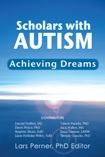Scholars with Autism Achieving Dreams
Lars
Perner, PhD., Editor
Darold A. Treffert MD noted psychiatrist and expert on savant autism and consultant to the film Rain Man introduces the writers and their chapters. Dawn Prince PhD discusses how her observation of gorillas led to insights into communication and a career as a primatologist. Stephen Shore EdD reveals interventions his parents developed much ahead of their time, and strategies he developed for himself. Liane Holliday Willey EdD developed teaching methods during imaginative play as a child that she would later apply to her work in autism. Valerie Paradiz PhD correlates racism toward black baseball players in the 1950s with prejudice she experienced on the spectrum. Nick Walker MA discusses his adaptation of the martial art of aikido to the self-regulation needs of individuals on the spectrum. Dena Gassner LMSW and Lars Perner PhD talk about methods of organization as well as compensatory strategies each of them developed. Temple Grandin PhD Emmy award-winning scholar and inventor presents how learning basic skills were critical keys to her success.
Dr. Treffert tells us in his Introduction, “The message of hope in this book is a welcome and refreshing one because in the past, too many times ‘experts’ had recommended institutional care.” Dr. Shore knows this all too well. In his chapter he reflects on a time when a physician saw institutionalization as the best option. There were moments in all the contributors’ lives that were impacted by events, people, circumstances or opportunities. They tell their heartfelt stories in the belief that these will lessen the burden on others, provide hope to readers, and help others on the spectrum pursue what they might now only dream about.
Sometimes it only takes one human being to transform a life. Emmy-Award winning scholar and bestselling author Dr. Temple Grandin makes frequent references to her science teacher who had tremendous confidence in her and how remarkable results were borne of it. Nick Walker talks about one teacher who inspired faith in him, ultimately transforming his pastime of cartooning into serious art—a confidence that continued to build in other aspects of his life. Dr. Willey reveals the pillar her father was in her life and how such love deeply impacted her. Dr. Prince tells how she went from homeless and hopeless to self-discovery and scientific exploration that finally brought purpose and peace.
You will rise to rejoice with all the contributors when they reach the mountaintops and proudly tell you of their successes. But you’ll also take a ride through the swampland of emotions and turmoil. Chapter to chapter you will read and recognize key factors that were important in the young and developing lives of these scholars. They share some of the deepest, even darkest secrets. Dena Gassner writes of the trials and tribulations in relationships and the subsequent violations of trust. You’ll know the torment. You’ll get a sense of the anxieties and fears. And you’ll become aware of the hyper-sensate world of autism where a mere touch of reassurance and love can feel like a blow to the body. Or as Dr. Perner discloses, seeing no useful purpose in mentioning pain as a child when a physician began progressively sticking him harder and harder with a sharp probe expecting a response, then asking, “Don’t you feel anything?”
You’ll see their frustrating sense of incompetence that competes with their other sense of brilliance. You’ll witness their view of intolerance to society’s complete misunderstanding of who they are, of who they want to be, of who they can be. Dr. Paradiz reports what it feels like not to be neurotypical, to battle depression, to stay employed, and concludes that in order for the world to better understand those on the spectrum, “We must do all we can to change attitudes.”
_____________________
ABOUT THE EDITOR
Lars Perner, Ph.D. was diagnosed with Asperger’s syndrome at age thirty-one in 1995 and subsequently became interested in the autism spectrum. He is an Assistant Professor of Clinical Marketing at the Marshall School of Business / University of Southern California and has written extensively on autism issues, including college preparation for individuals on the spectrum, the use of special interests to enhance learning, the ‘big picture’ of autism, and the importance of research to identify autism subtypes.

